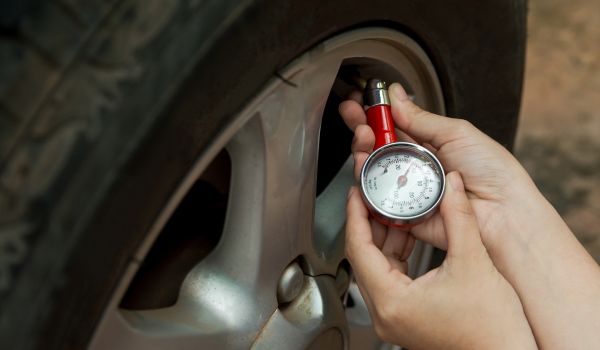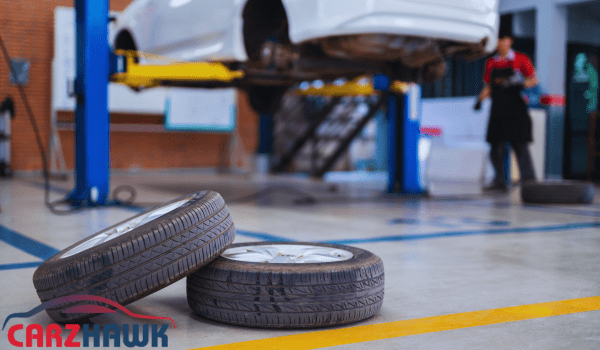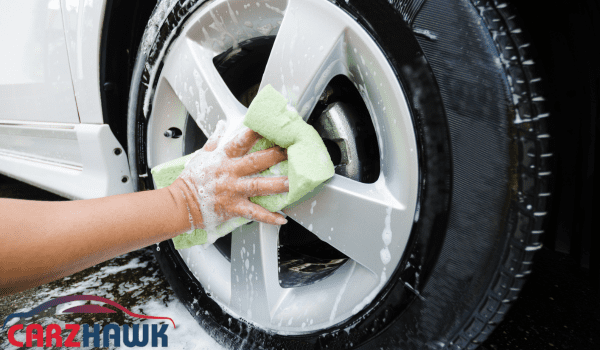An air cap is a small, round cap that goes over your tire’s valve stem. What the air cap does is keep dirt and other things from getting into the valve stem, where they could cause a slow leak. If your Tire Air Cap is Missing, your tires will still lose air at the same rate. Putting on a cap is important to protect the valve stem from dirt and water, though. The valve stem controls how much air is in your tires, so it’s important to keep it clean and tight. In this blogpost, we will get to know if Tire Air Cap Missing : Will Tires Lose Air Faster?
What’s the Valve Cap for?
Keeps the Air in the Tire
If you pump up your tire, the air pressure inside it is higher than the pressure in the air outside the tire.
It’s this difference in pressure that makes the walls of the tires push against each other and try to drive the air out of the tires. This is avoided by the valve cap, which seals the valve stem and keeps the air pressure inside the tire.
It Helps Keep Things from Getting Dirty
The valve cap also keeps the air inside the tire from getting dirty. When a tire is filled, the air inside it is pushed together. This pressure keeps dirt and other things from getting into the tire. The valve cap helps to keep dirt and other things from getting into the valve stem.
Helps Keep Tire Pressure Up
It’s also the valve cap’s job to keep the air pressure inside the tire steady. Once more, when a tire is filled, the air inside it is pushed up and down.
Because of this pressure, the tire walls don’t fall apart. In order to keep the air pressure inside the tire steady, the valve cap helps to seal the valve stem.
It helps Stop Leaks
The Schroder valve stem has a small hole in the middle of it. When the tire fill, this hole lets air into the tire. This hole is covers the valve cap, which keeps air from leaking out of the tire.
It Keeps the Valve Stem Clean
The valve cap cleans the valve stem as well. The stem of the valve is out in the weather and can get dirty. This causes the valve stem to get clogs, making it hard to pump up the tire. Filth and other things can’t get into the valve stem because of the valve cap.
It Helps Avoid Corrosion
On top of that, the valve cap keeps the valve stem from rusting. The head of the valve is out in the weather and can rust when it gets wet. The valve cap helps keep the valve stem clean and free of damage from the weather.
Why your tire keeps losing air
Valve Stem Not Working
If the stem of your valve doesn’t close properly, air will slowly leak out of your tire. At first, you might not notice that your tire pressure is dropping, but over time, you will.
Looking at the condition of the valve stem itself is generally enough to tell if it is faulty. If it is dry, cracked, or otherwise broken, it probably doesn’t seal right and needs to change.
Rim Damage
In the event that your rim is faulty, your tire may lose air. A small crack or dent in the rim can make it hard for the tire to sit straight and can even let air escape.
Most of the time, you can tell if your rim is faulty by finding cracks, dents, or other damage. If your rim looks broken, you should get a new one.
Tire With Holes
A hole is one of the most common ways for a tire to lose air. Depending on how big the hole is, air will slowly leak out of your tire until it is flat.
Most of the time, a small hole in the tire will let you know if you have a puncture. Do not drive with a flat tire. Instead, take it to a mechanic to be fixed or changed.
Damage to Beads
The part of the tire connects the tire to the rim bead. If this seal break, air can leak out of your tire. This could be caused by things getting stuck.
If you see a space between the tire and the rim, that means you have bead damage. If you see a hole in your tire, you should fix or change by a mechanic.
How the Temperature Changes
Your tire pressure can change when the temperature changes a lot. This is because air gets bigger when it’s hot and smaller when it’s cold. On the other hand, the air in your tires will go down when the temperature goes up and back up when the temperature goes down.
When you use a tire measure to check your pressure, you can usually tell if it has changed. You should make the necessary changes if the pressure is not what it should be.
Worn-Out Tires
Over time, tires lose air on their own. This is because the seals become less tight and the rubber breaks down. With time, this means you’ll have to add air to your tires more often.
The state of your tires will generally tell you if they are losing air because they are old. These are probably losing air because they are old and dry if they are cracked, dry, or otherwise broken. You should get new ones.
Why Do The Valve Caps On My Tires Keep Coming Off
Wear on the Threads of the Valve
The valve stem goes into the hole in the rim, and then the cap is screwed on to make it tight. Threads can wear out on either the valve stem or the hole in the rim over time. This can make the valve cap loose, and it may even fall off.
Valve caps that don’t fit tightly
Most of the time, this is because the valve cap was screw on too tightly or across the threads. This could hurt the threads, which would make it hard to get a good fit. Valve caps can also come loose if dirt, dust, or other particles stuck in the threads and stop the seal from being tight.
Cracks and Holes
If you hit a bump or rut, the valve stem and cap can get jarred, which can make it loose or fall off completely. This is more likely to happen if the valve cap isn’t tight enough on or is already open.
Vibrations
Even if the valve cap is tightly screw on, moving can make it loosen up and fall off. The stem of the valve or worn-out threads make this more likely to happen.
FAQ
How Tight Must the Valve Caps Be?
Even though valve caps shouldn’t be loose, they shouldn’t be too tight either. You should be able to take them off when you need to.
You could lose your valve caps if they are too loose. This would let air out of your tires, which would cause them to go flat. If the caps on your valves are too tight, you could damage the valves and let air out of your tires.
Without Caps, Do Tires Lose Air?
No, without caps, tires won’t lose air. The valve cap’s job is to keep dirt and other things from getting into the valve stem and clogging the valve, which would stop air from getting into the tire.
What Amount Of Air Should I Put In My Tires?
You should put the right amount of air in your tires based on the type of tire, its size, and what the maker says. This information is often on the rim of the tire.
Conclusion
The valve caps are useful, and losing them can have effects other than letting air escape from the tire.
A clean valve stem is important for getting air into the tire, and the valve caps help keep it clean. The part that controls how much air goes into and out of the tire is valve stem. You can lose air flow if your valve stem is faulty.







